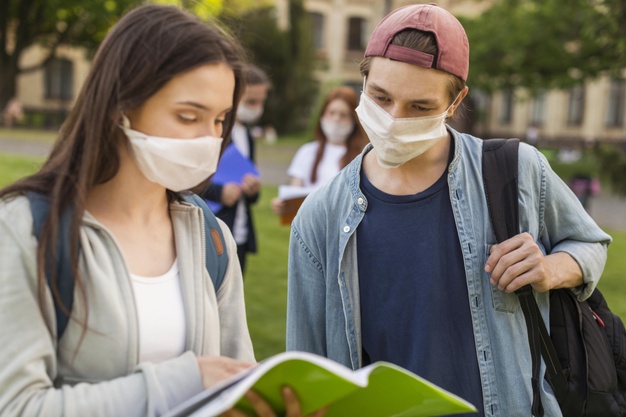Among the difficulties people around the world have with the Coronavirus, teenagers experience their own unique relationship with the pandemic. Teenagers are dealing with the pandemic during one of the formative times of their lives. Driving to school is one the things they look forward to. This year driving even carpooling with other teenagers will be different.
The pandemic comes at a time when teenagers often start acting with more independence. For one, they are legally permitted to drive for the first time in their lives, giving more freedom and opportunities away from adult supervision. These factors put teens in a notable position of concern from both a safety perspective and parents’ stress levels (find the CDC’s teen support page here).
Still, teenagers play an important role in the public health crisis and need to contribute their efforts to reduce the virus’s spread. Most important is their participation in getting to school. With the help of parental guidance, teenagers who carpool independently need to be equipped to act responsibly.
Establish the Reality of COVID-19 and How Teenagers Can Make A Difference
Parents will start now to teach teens how to properly take safety measures to protect against the Coronavirus. It is crucial to clearly educate them on exactly what the virus is and how it affects them and their members of their immediate and extended families. Helpful information includes:
- How the virus started
- How the virus is transmitted
- How many people have contracted the virus
- What they personally can do to fight against the virus
Jacqueline Sperling, PhD, contributor for Harvard Health Publishing, explains more on how to inform teens about these questions here.

Knowledge of the virus helps teenagers better understand why it is important that they take active safety measures. Maintaining passenger conduct and vehicle sanitation (see more on this in our “Getting Your Child to School Amid COVID-19” post) are examples. Even though the virus adds responsibility for teen drivers, it is important that, just like following the rules of the road, they recognize their personal ability to make a difference in reducing the spread of the Coronavirus.
By providing teens with an accurate understanding of what the Coronavirus is and how they can protect themselves (and others), they will be more likely to act appropriately while enjoying their driver independence.
Empower Teenagers to Speak Up
Teenagers who carpool need to feel comfortable to address concerns with their fellow passengers. Some teenagers may encounter a situation where a peer in their carpool, maybe unknowingly, falls short on one of the established safety measures. This situation calls for them to speak up and discuss with others in the carpool.
It is not uncommon for teenagers to experience anxiety or hesitation toward confronting their peers. But with knowledge of the seriousness of the virus, they will be able respectfully speak up and hold their peers accountable. Just like drivers have a right to speak up about passenger distractions, the age of the Coronavirus extends this to new safety norms, like mask wearing.
Carpooling to school is a sustainable opportunity for teens to save time and money while enjoying socialization with their peers. This is especially true for teenagers new to their school. Yet, the benefits of carpooling are compromised if the teenagers in the carpool are exposed to unsafe conditions. Establishing travel safety rules and empowering teens to speak up to enforce them helps protect everyone involved.
Level with Teenagers
Being a teenager during this pandemic can be an especially frustrating experience. Several iconic life moments (dances, graduations, sports, etc.) have been stripped away from this age group. While they are forced into physical isolation, they can begin to feel anxious or stressed about their day-to-day lives.
As a parent, we bet you may be feeling your own stress about protecting your teenager during this unprecedented time. If your teenager is to return to school this fall, you want to know that precautions are taken to keep them safe. Still, it is important to take steps to support their safety without overwhelming them. Children’s Hospital Colorado offers tips for how to talk to teenagers about the Coronavirus: give teenager space; help them form a healthy routine; create time for family; encourage your teenager; resist the urge respond quickly to their illogical comments; and check on your teens mental health.
Providing teenagers compassion while talking to them about the Coronavirus will encourage them to take pride in acting responsibly. Families who choose to engage their teenagers in independent carpools, walkpools, or bikepools offer teenagers an opportunity to experience some normalcy in their school day.



